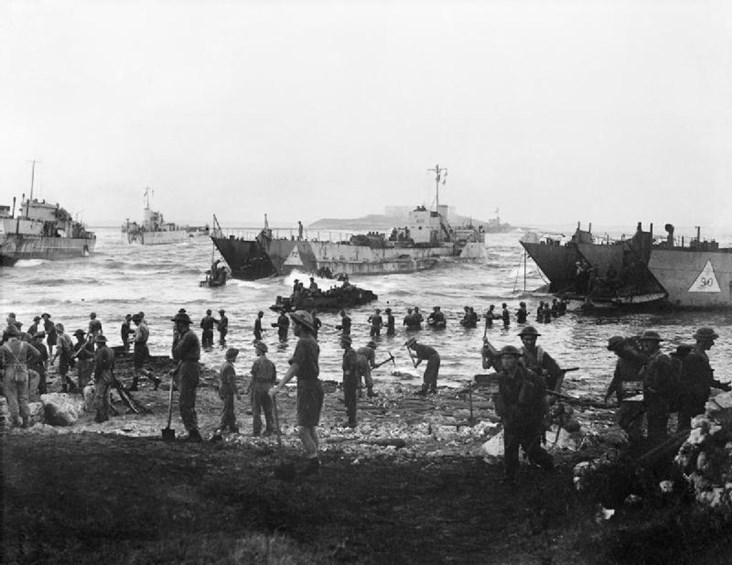At Last We Have 'Struck Oil' in Rumania
The War Illustrated, Volume 7, No. 161, Page 186, August 20, 1943.
One-third of Germany's fuel for her war machines has been coming from the oilfields and refineries of Rumania. Now Ploesti, centre of that supply, has been very heavily bombed by the Allies. HENRY BAERLEIN discusses in this article possible reasons for our delay in assaulting this vital target.
The Russians have once or twice bombed the oil refineries at Ploesti, the centre of the Rumanian oil industry and an important railway junction to the north of Bucharest. Five of the fourteen refineries are situated in a straight line along the Ploesti-Buzau railway, and are the kind of target of which bombers dream; nor are any of the others difficult to spot.
It has been argued that it is difficult to transport oil to the German Army, but then Hitler has sent his Army to the Rumanian oil, basing his operations in the Balkans on those supplies. We were likewise told that oil production in Rumania was decreasing and, therefore, bombing was not worth while; the fact is that Germany is not anxious to produce more than she needs at the moment, as oil in storage tanks is more vulnerable to air attacks than oil below the surface. When it is said that Rumanian oil is of low grade, the answer is that any low-grade oil can be treated by chemical processes to produce high-grade petrol.
At the outbreak of the war only 7 per cent of the oil production was contributed by Rumanian companies, whereas 93 per cent came from foreign companies: British, American and so forth. At a critical point in the last war the British-owned wells were dealt with quite effectively; and I am told by an Englishman who had long lived in Rumania and did not leave till the last moment that this time these wells had been mined, but that for some reason unknown to him nothing further was done. One remembers that French and German electricity companies were selling each other power across the frontiers even after the outbreak of war. And did not Mr. Will Lawther, the President of the Mineworkers' Federation, protest at Swansea in June 1939 at the huge exports of scrap metal which we were allowing to be sent to Germany?
It appears that the British and French companies in Rumania transferred their rights at the outbreak of war to the companies of countries not as yet involved, such as the United States and Holland, these in their turn transferring the rights to neutrals – which does not in the least prevent the Germans from helping themselves to this commodity. And when they are compelled to quit Rumania they will not leave in a nice condition what still remains of the wells and refineries.
Until 1939 most of the Rumanian Budget was based on oil taxes, and any decrease in the amount pumped-up created Budget difficulties. Foreign shareholders held the whip-hand and could take decisions that would affect the daily bread of a country. It was to remedy this unbearable situation that the nationalization of the subsoil was brought about.
Ex-King Carol planned to use his country's oil as a barrier against Hitler's marauding hordes. Throughout the winter of 1939-40 “Carol's Dyke”, which was to be better than the Maginot and Siegfried Lines, was being constructed at the frontiers. Instead of reinforces concrete and steel it was made of mud, and was to be flooded with oil and set on fire if Hitler should attempt to invade the country. Carol felt he could rely on powerful potential allies in Britain and France. But his confidence was killed by a message from London: why, it was asked, was Rumania selling more oil to Germany than to Britain?
Mr. Chamberlain must have known that Rumania badly needed both money and armaments. Britain had told her that she was not much interested in Rumanian oil, as she could get better quality elsewhere and at a cheaper rate. Germany, on the other hand, was willing to pay anything – guns, tanks or gold. Headlines began to appear in our papers: “Scotland bombed by German planes using Rumanian oil”, or “British merchantmen sunk by German planes using Rumanian oil”. The general verdict was that Rumania had been treacherous.
But who sold, this Rumanian oil to Germany? Was it the Rumanian people? Was it Carol? Or was it the foreign oil companies? The Rumanian Government could control quotas, but the selling was managed by those who actually held the concessions. The Government collected taxes on production and exports, but did not act as a selling agency. Carol established a Board whose duty it was to keep a strict watch on the dealing of the foreign companies, but this only made matters worse for Britain, as this Oil Board was considered a further infringement of the property rights of the companies.
And now, happily, the Allies have very thoroughly attended to Ploesti. On August 1, 1943, in full daylight, a force of Liberators flew 2,400 miles in all, and wrought destruction there from tree-top height. The Astro-Romana refinery, the biggest plant of its kind in Europe, was heavily damaged. The Creditul Minier refinery, the only one producing high-octane aviation fuel, was completely covered with bombs; there was a direct hit on Colombia Aquila, the fourth largest refinery; many explosions were reported from the pumping-station of the Giurgiu pipe-line. But the greatest damage of all was inflicted on the Americana Romana and Orion refinery.
It is known that for three months offensive in Russia the Germans require about a million tons of oil; the maximum refinery capacity of all Rumania is 32,000 tons a day, of which nearly 25,000 were until the other day refined at Ploesti. Now this vital supply has been almost closed down and German engineers in Rumania will be as unemployed as those who went towards the Caucasus with Hitler's army.
Index
Previous article
As the Sun Came Up On Invasion Day
With Pick and Shovel the Way is Cleared. Our ships and men crowded the Sicilian beaches as dawn broke on July 10. Coastal batteries had been silenced and shore defences vanquished, and troops and na
Next article
I Was There! - 'Down With Mussolini and Death to the Duce!'
Extraordinary scenes of jubilation were witnessed by Ross Munro, Canadian Press Correspondent in Sicily, when news of the resignation on July 23, 1943 of the Pinchbeck Ceaser – Benito Mussolini, Dic





